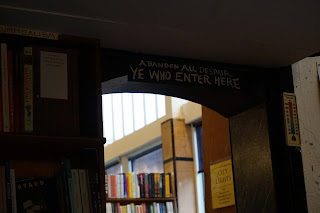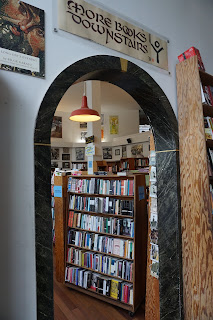Otsuka, Julie. The Buddha in the Attic. New York: Random House Inc., 2011.
While in San Francisco earlier this month I had the opportunity to visit a magnificent bookstore, 'City Lights Bookstore & Publishers', located on Columbus Avenue at Broadway in North Beach. Founded in 1953 and still known as "one of the few truly great independent bookstores in the United States," the very walls are steeped in poetry, and I deeply inhaled the happy scent of papyrus as we entered. Arched doorways, multiple floors boasting yet more sections of books, and a history that saw the shop as a meeting place for discussions about "anti-authoritarian politics and insurgent thinking" makes this bookstore a true gem for any lover of books and freedom. (www.citylights.com)
 |
| My own little slice of heaven. |
 |
| The hand-written sign above the door reads, "Abandon all despair, Ye who enter here." |
The following excerpt will give you a small but lovely taste of Otsuka's flavour:
"On the boat we could not have known that when we first saw our husbands we would have no idea who they were. That the crowd of men in knit caps and shabby black coats waiting for us down below on the dock would bear no resemblance to the handsome young men in the photographs. That the photographs we had been sent were twenty years old. That the letters we had been written had been written to us by people other than our husbands, professional people with beautiful handwriting whose job it was to tell lies and win hearts. That when we first heard our names being called out across the water one of us would cover her eyes and turn away - I want to go home - but the rest of us would lower our heads and smooth down the skirts of our kimonos and walk down the gangplank and step out into the still warm day. This is America, we would say to ourselves, there is no need to worry. And we would be wrong." (Otsuka, p.18)
Reading about this time in American history leading up to and including the internment of the Japanese following the bombing of Pearl Harbour, I felt myself reeling now and again, the hairs on my arms rising in goosebumps as this injustice born of fear played out on the pages before me. And while I so badly wanted to shake my own fears away with placating thoughts such as, "But that was a long time ago and we've come so far from those days," I could not deceive myself thus. The Buddha in the Attic is not only a beautifully written book, it is an important book. It stands as yet one more reminder that we need to learn from our mistakes, so as never to repeat them. I believe that we are standing on something of a precipice these days, and that the pendulum of society is balancing precariously upon it. And for the good of all, we need to remember that this Earth supports one race: the human race.
Straying from my book review slightly, I'd like to share with you a framed poem that I discovered on the top floor of City Lights. Written by Lawrence Ferlinghetti, the co-founder of the bookstore, I couldn't get over the relevance of this poem today, and I felt that, though he wrote the words years before, it could have been written on that very day as I stood there a few weeks ago. This gave me an eerie sense of destiny predetermined, which then gave way to a more realistic thought: we, as humans, all too often cycle through our mistakes repeatedly, sometimes with slight variations on the theme, but nevertheless, we ride the ferris wheel over and over again. I've copied the poem below, and have also included the photo I snapped of the framed words that I read.
Pity the Nation
(After Khalil Gibran)
Pity the nation whose people are sheep
And whose shepherds mislead them
Pity the nation whose leaders are liars
Whose sages are silenced
And whose bigots haunt the airwaves
Pity the nation that raises not its voice
Except to praise conquerors
And acclaim the bully as hero
And aims to rule the world
By force and by torture
Pity the nation that knows
No other language but its own
And no other culture but its own
Pity the nation whose breath is money
And sleeps the sleep of the too well fed
Pity the nation oh pity the people
who allow their rights to erode
and their freedoms to be washed away
My country, tears of thee
Sweet land of liberty
~Lawrence Ferlinghetti
My wonders: Have you read this book, or Otsuka's other novel, When the Emperor was Divine? If so, what were your thoughts? Do you enjoy reading historical fiction? If so, please share any favourite titles in this genre with me. And what are your thoughts on Ferlinghetti's poem? Oh, how I'd enjoy talking to the poet today - believe he's 97 years old - about how his words from years ago apply so aptly today.





No comments:
Post a Comment